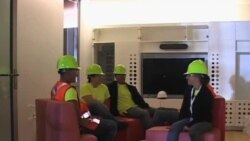LOS ANGELES —
A team from Austria wins first place in this year's Solar Decathlon held in Irvine California. Sponsored by the U.S. Department of Energy, it is a biennial event where collegiate teams from around the world compete to build the most energy efficient solar-powered home that is also affordable and attractive. One team in this year’s competition is from the University of Southern California. Even though Team USC did not win, the members say the experience helped them create a solar family.
As the minutes go by, the pressure builds.
In a home powered by the sun, Evyn Larson and her teammates, from the University of Southern California, are hosting a dinner party for their opponents. This is one of 10 competitions in the Solar Decathlon. From the food to the ambience, everything will be judged by members of other teams.
While Larson and her teammates are in the kitchen, project manager Justin Kang is monitoring other parts of the house. “It’s quite stressful to see numbers and screens every hour,” he said.
The numbers come from sensors that record temperature and and humidity. The team can earn points based on those numbers.
Just a few days ago, Team USC was still finishing the inside of the home and checking to make sure everything works. That includes a sun roof that opens and closes with the push of a button. Each team had nine days to assemble a house on the runway of a former Marine Corps base.
”You’d be surprised that, over a year and a-half of seeing each other every day, every waking hour, we still have a very amicable relationship. We like to go out together," Kang stated. "We crack jokes and we’re very close. It’s like a solar family that we created within our community.”
That experience taught them a lesson. “In the real world, nothing is perfect. There’s always glitches and snags I hit everyday," explained Kang. "Instead of complaining and whining you have to roll with the punches and find ways around it."
With lessons learned and the house finished, it's time to show it to the judges and the public.
Most American homes do not run on solar power for a good reason, said Richard King, director of the Solar Decathlon. “Cost is a factor absolutely, and it’s because you’re buying equipment, and they’re fairly expensive," he said.
But a few houses, including this one, will become real homes. USC is donating this house to a family near the university.
“I think it’s very exciting to think about somebody just living in it and it’s their home and they’re super comfortable in it," Larson noted.
A California family will give the home a purpose beyond the competition and hopefully love it as much as Team USC does.
As the minutes go by, the pressure builds.
In a home powered by the sun, Evyn Larson and her teammates, from the University of Southern California, are hosting a dinner party for their opponents. This is one of 10 competitions in the Solar Decathlon. From the food to the ambience, everything will be judged by members of other teams.
While Larson and her teammates are in the kitchen, project manager Justin Kang is monitoring other parts of the house. “It’s quite stressful to see numbers and screens every hour,” he said.
The numbers come from sensors that record temperature and and humidity. The team can earn points based on those numbers.
Just a few days ago, Team USC was still finishing the inside of the home and checking to make sure everything works. That includes a sun roof that opens and closes with the push of a button. Each team had nine days to assemble a house on the runway of a former Marine Corps base.
”You’d be surprised that, over a year and a-half of seeing each other every day, every waking hour, we still have a very amicable relationship. We like to go out together," Kang stated. "We crack jokes and we’re very close. It’s like a solar family that we created within our community.”
That experience taught them a lesson. “In the real world, nothing is perfect. There’s always glitches and snags I hit everyday," explained Kang. "Instead of complaining and whining you have to roll with the punches and find ways around it."
With lessons learned and the house finished, it's time to show it to the judges and the public.
Most American homes do not run on solar power for a good reason, said Richard King, director of the Solar Decathlon. “Cost is a factor absolutely, and it’s because you’re buying equipment, and they’re fairly expensive," he said.
But a few houses, including this one, will become real homes. USC is donating this house to a family near the university.
“I think it’s very exciting to think about somebody just living in it and it’s their home and they’re super comfortable in it," Larson noted.
A California family will give the home a purpose beyond the competition and hopefully love it as much as Team USC does.










